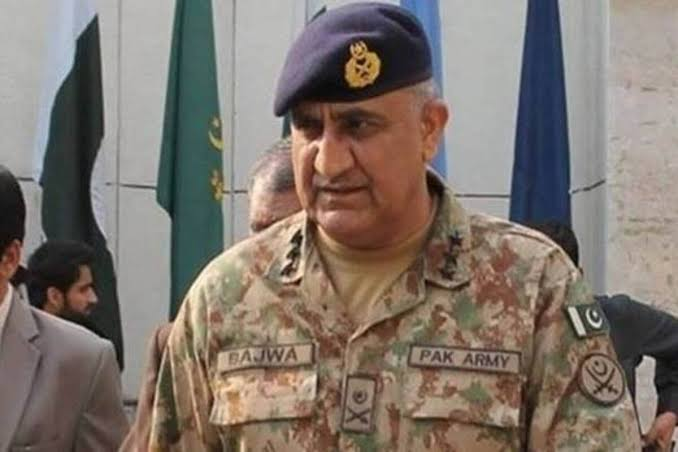General Qamar Bajwa has delighted the Wagah Border crowd by his statements on the desirability of Pakistan and India working together hand in hand. None will question the wisdom behind the suggestion made so often in the past that the two countries should have better ties with each other. Certainly Prime Minister Narendra Modi has consistently shown that he is willing to walk the extra ten miles in order to search for peace with Pakistan. The problem is that the Pakistan army continues to seek to implement its long-running campaign of sabotage and destruction in India, not just in Jammu & Kashmir but elsewhere in the country as well. PM Modi was correct to point out to his counterpart in Islamabad that avoidance by Pakistan (the military and its affiliated organisations) of terror and other disruptive activities against India is a precondition for better relations. Given that the foundation of the strategy of GHQ Rawalpindi is hostility to India, it would be an optimist indeed who expects peace to break out as long as the military calls the shots over the essentially powerless Imran Khan, who may be said to reign while General Bajwa rules. This is a fact understood by the Communist Party of China, which reserves its serious diplomacy and planning of joint operations (mostly with a focus on India) to discussions between the PLA and GHQ Rawalpindi. Sending of a missive to Prime Minister Khan is an act of courtesy and politesse, but the Prime Minister of India will be well aware that the gentleman to whom the letter of greetings is addressed has no power whatsoever to bring the military to heel, unlike the case in India, where the political leadership can ensure that such concessions as the withdrawal from Haji Pir at Tashkent in 1965 or the recent withdrawal from Kailash heights by the Indian Army takes place without a murmur of protest from the Indian Army. Actions, it is said, speak louder than words, and the actions by GHQ Rawalpindi and the PLA belie the frequent protestations from Islamabad and Beijing that what both seek is a cosy relationship with India. Of course, they are silent on the systematic manner in which they themselves have muddied the atmosphere through incursions and backing for non-conventional warfare against the world’s largest democracy. They in fact deny that any such thing has taken place or indeed has ever taken place. Foreign Minister Wang Yi and various PRC spokespersons have repeated the obviously incorrect statement several times that it was India that was responsible for aggressive action against China, something that nobody in the establishment in Beijing or anywhere else in the world will take seriously. Several times, those interested in a good relationship between China and India have warned of the danger so far as relations between the two sides are concerned of the PLA and other agencies of the PRC serving as a force multiplier for the Pakistan army, navy and air force. Such warnings have been brushed aside, and the collaboration relating to India on the part of the two militaries continues at speed. While only a few million dollars have been set aside by the PRC as assistance to Afghanistan, nearly $60 billion has been set aside by the Chinese government to spend on just the China Pakistan Economic Corridor. A time will come when the manner of involvement with Pakistan is the subject of regret and recrimination in Beijing in the manner that the intensification of involvement in Afghanistan was for the USSR, but such a realisation is some years distant. Meanwhile, surpluses arising out of trade with India can be used to pour into the bottomless pit that Pakistan represents for the Peoples Republic of China. This in a context where GHQ Rawalpindi has transparently failed to justify the immense and deadly help given to it by Beijing by slowing down the march of India to the status of the third biggest economy in the world in purchasing power terms. Whether it be missiles or nuclear capability, there is a “Made in China” logo that ought to be prominently displayed on such assets of a military that makes no secret of its interventions in Iran, India and Afghanistan, and for some time, in the US and the EU as well. The assistance given by the PRC to the “special projects” of the army in Pakistan extends to far more than interventions in the UNSC or the FATF to protect Pakistan from the consequences of the misdeeds committed by its military and their satellites. A long spoon is needed to sup with such forces, and the longer the better. While lighting candles at the Wagah border or calling for Hindi-Chini Bhai Bhai are harmless pastimes that speak volumes about the good intentions and yet lack of touch with reality of those who constantly believe that peace between India and Pakistan or India and China is going to break out or has already done so. It is certain that PM Modi is fully aware of this, and that the nation needs to be on guard to block ongoing efforts by the two “all weather” (against India) allies to damage the future of the people of this country. PM Modi has correctly implied in his letter to Pakistan PM Imran Khan that better relations demand more than soothing words, including from General Bajwa. What is needed is action to translate such expressed wishes into a reality that would if realised be welcomed by all, and thus far, such a transformation still appears to be distant.

